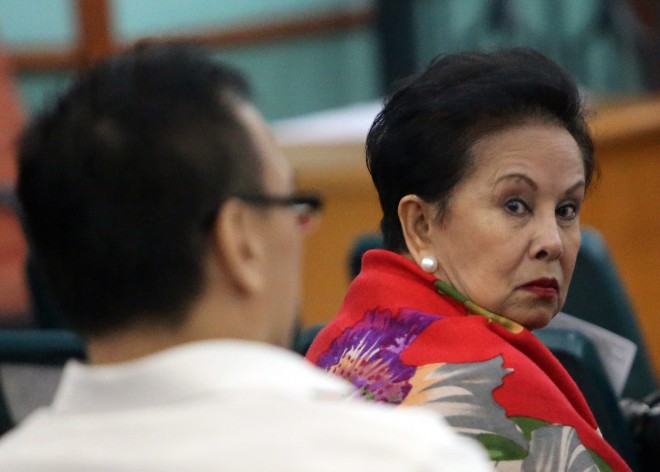State prosecutors have appealed the Sandiganbayan’s denial of the bid to drop the graft charge versus former Makati City councilor Ernesto Aspillaga to turn him into a state witness against former Mayor Elenita Binay.
Seeking to change the court’s mind, the prosecution lamented that “at the end of the day, vital testimony will be suppressed” if it did not allow Aspillaga to testify against Binay for the alleged anomalies in the procurement of P72.06-million worth of furniture for the city hall in 1999.
In a nine-page motion for reconsideration, the Ombudsman’s Office of the Special Prosecutor disagreed with the Special Fifth Division’s pronouncement that they pursued the wrong method of discharging Aspillaga.
The court had voted 3-2 to grant Binay’s bid to block the discharge of Aspillaga, stating that the prosecution should not have sought the remedy under Section 17, Rule 119 of the Revised Rules of Criminal Procedure.
It said that since Aspillaga was already admitted by the Department of Justice to the witness protection program, the proper way for the prosecution would be to amend the charge sheet under Sec. 14, Rule 110 of the RRCP.
‘Serious error’
Prosecutors, however, said the Court “made a serious error” and insisted that the Rule 119 mode was the one applicable in Aspillaga’s case.
The appeal stated that the “substantial amendment” of the charge sheet under the Rule 110 mode can only be made before arraignment. Dropping an accused in such a way that it affects the others’ defense was deemed a “substantial amendment.”
Aspillaga was already long arraigned on Dec. 3, 2010. It was only during the Sept. 25, 2014 hearing by the Senate blue ribbon committee that he accused the Binay family of rigging the procurement of the city’s contracts.
If the prosecution heeded the court’s suggestion, it raised the possibility of running afoul of the Rules of the Court.
“The procedure suggested by the court is worrisome as it could lead to a procedural dead end,” the motion stated.
Prosecutors said that if they abandoned the discharge under Rule 119 and pursued an amendment under Rule 110, “in all likelihood, the amendment will be denied by the court.”
The appeal also cited the Supreme Court’s 2005 Soberano ruling, which states that Rule 119 is applicable when the prosecution wants to discharge a trial defendant before it rests its case.
Prosecutors added the court’s resolution would also thwart the intention of the Witness Protection, Security and Benefits Act that mandates the discharge of persons admitted to the WPP so they can testify as state witness.
“It is now incumbent upon the Court to discharge accused Aspillaga in accordance with R.A. No. 6981,” the prosecution said.
Vital witness
Prosecutors considered Aspillaga’s testimony to be vital to the case because of his first-hand knowledge of the allegedly anomalous transaction as former head of the city’s general services department.
Aspillaga told the Senate blue ribbon subcommittee that almost all the public biddings conducted by the city during the Binay family’s longtime reign were rigged. He described the procurement of various contracts over the years as “moro-moro (just for show)” or “bidding-biddingan (pretend bidding).”
Months after Aspillaga’s Senate testimony, he was admitted to the WPP and granted state witness immunity from criminal prosecution.
The assailed Dec. 9 court resolution was actually reached via split vote. Justices Roland B. Jurado penned the resolution with the concurrence of Justices Samuel R. Martires and Geraldine Faith A. Econg.
Justices Ma. Theresa Dolores C. Gomez-Estoesta and Maria Theresa V. Mendoza-Arcega dissented, also raising the point that the prosecution’s request “cannot be nipped outright because of a perceived procedural error.”
“Otherwise, this would lamentably be seen as suppressing a vital and material piece of evidence that may have a niche in the prosecution of the case,” the dissenting justices bemoaned.
This specific case is the last pending case against Binay in connection with the alleged irregularities in the purchase of supposedly overpriced furniture for the city hall from 1999 to 2000.
Binay had won three other cases, with the Fifth Division granting her demurrer against a separate P21.7-million graft case. The Second Division on Apr. 7, 2011 similarly dismissed a P58.04-million graft case on demurrer, while the Fourth Division on Nov. 17 acquitted Binay after her P13.25-million graft case went through a full-blown trial.
She also faces four graft and malversation cases pending before the Third Division over the purchase of P45-million worth of hospital beds and sterilizers for the city-run Ospital ng Makati in 2000 and 2001. JE
